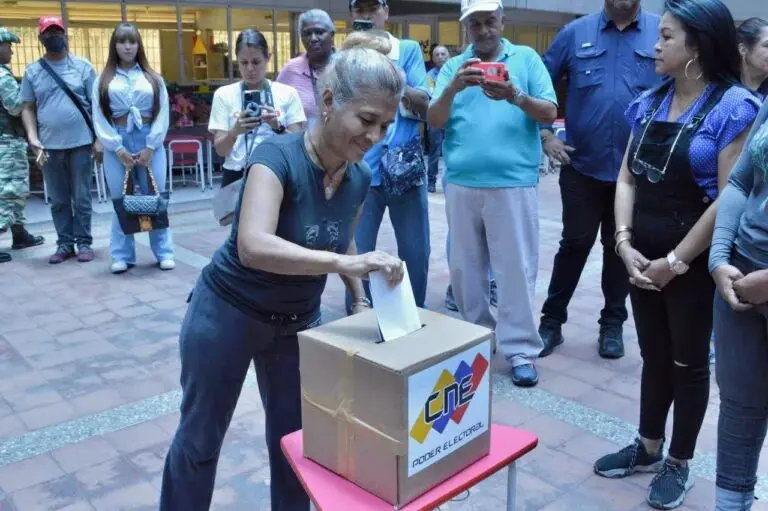Venezuela Strengthens Communal Democracy: Over 21 Million to Elect Local Leaders on July 27

Venezuelan communities to decide their future: municipal elections and youth-led popular consultation set for July 27.Photo: Photo: Communes and Social Movements.
July 21, 2025 Hour: 4:25 pm
With more than 21 million voters and 148,000 candidates, Venezuela prepares for a landmark municipal election that deepens grassroots democracy and defends national sovereignty amid ongoing external threats.
Related:
Venezuela Accuses El Salvador of Torturing Deported Migrants
Venezuela is preparing for one of its most significant democratic events of recent years. On Sunday, July 27, more than 21 million voters will elect mayors and council members across the country, reaffirming popular commitment to building democracy from the grassroots and defending national sovereignty from external threats.
The magnitude of this electoral process is historic: 148,554 candidates are contesting 335 mayoralties and thousands of municipal council seats, supported by more than 50 national, regional, and indigenous political organizations. The stable electoral roll of 21,485,669 Venezuelans not only reflects the participatory spirit of the people but also the institutional maturity of a system that remains strong despite constant external pressures.
The National Electoral Council, led by Elvis Amoroso, is implementing the electoral calendar with technical rigor: 16 audits are scheduled, and over 80% of preparatory activities were completed by early July. All political forces are involved in the oversight procedures, reinforcing the legitimacy and transparency of Venezuela’s electoral system, which counters unfounded criticism and resists attempts to undermine the country’s democratic autonomy.
Against this backdrop, the Simón Bolívar Great Patriotic Pole enters the election with renewed confidence after its decisive victory in the May 2025 elections, winning majorities in governorships and the National Assembly.
Venezuela avanza en el cronograma electoral del 27 de julio, donde la población elegirá 335 alcaldes y 2.471 concejales, con la participación de 36 partidos políticos (13 oficialistas y 23 de oposición). Además, se realizará una consulta popular simultánea donde los jóvenes… pic.twitter.com/qiqJJkodH6
— teleSUR TV (@teleSURtv) July 21, 2025
The text reads: Venezuela advances its electoral schedule for July 27, when the population will elect 335 mayors and 2,471 councilors, with the participation of 36 political parties (13 ruling and 23 opposition). Additionally, a simultaneous popular consultation will be held in which young people will choose the projects they wish to implement in their communities.
The United Socialist Party of Venezuela brought unprecedented innovation to candidate selection through direct consultation with 47,000 communities, generating more than 155,000 grassroots proposals,an exercise in participatory democracy that goes beyond traditional top-down party methods.
With a campaign strategy aiming to win all 335 mayoralties, including traditional opposition strongholds like Chacao and Baruta, the governing coalition is banking on public trust built on concrete results and profound social transformation over the past two decades.
The commitment to “Communal Power” and the creation of “communal circuits with more street-level representation” has given tangible form to a model transcending the limits of traditional representative politics.
More than 35,000 development projects will be subjected to the National Popular Consultation, running parallel to the elections, as organized communities take the lead in shaping investment and local priorities,an unprecedented exercise in direct democracy in Latin America.
This electoral process unfolds amid continuous threats and destabilization plots that have been dismantled by Venezuelan authorities. In the past 12 months, foreign and domestic mercenaries connected to sabotage attempts against the elections have been captured, and criminal networks with foreign funding and political connections have been neutralized.
These developments confirm that Venezuela continues to face attacks aiming to exploit the electoral context to destabilize peace and national self-determination. Exposing the ties between certain opposition groups, regional criminal organizations, and foreign interference underscores the gravity and complexity of the threats confronting Venezuelan democracy.
In the capital, Carmen Meléndez seeks re-election, building on extensive experience in executive roles and social management. In Miranda, the political geography shows a revolutionary presence in 15 out of 21 municipalities, while figures like Farith Fraija in Guaicaipuro embody generational renewal and community-based planning.
Key states such as Zulia, Bolívar, Barinas, and Lara feature Bolivarian candidates with rich backgrounds in local governance and social organization, reaffirming the diversity and depth of the revolutionary project across Venezuela’s regions.
The July 27 municipal elections mark a singular chapter in Latin America’s democratic history. Mass popular participation and the prominent role of communities position Venezuela as a reference point for the construction of genuinely popular democracy, firmly rooted in sovereignty and deepening constituent power from below.
In a time of threats and attacks on institutional stability, the Venezuelan people once again set an example of commitment, democratic creativity, and organizational capacity to determine their own collective future.
Author: YCL
Source: TeleSUR

